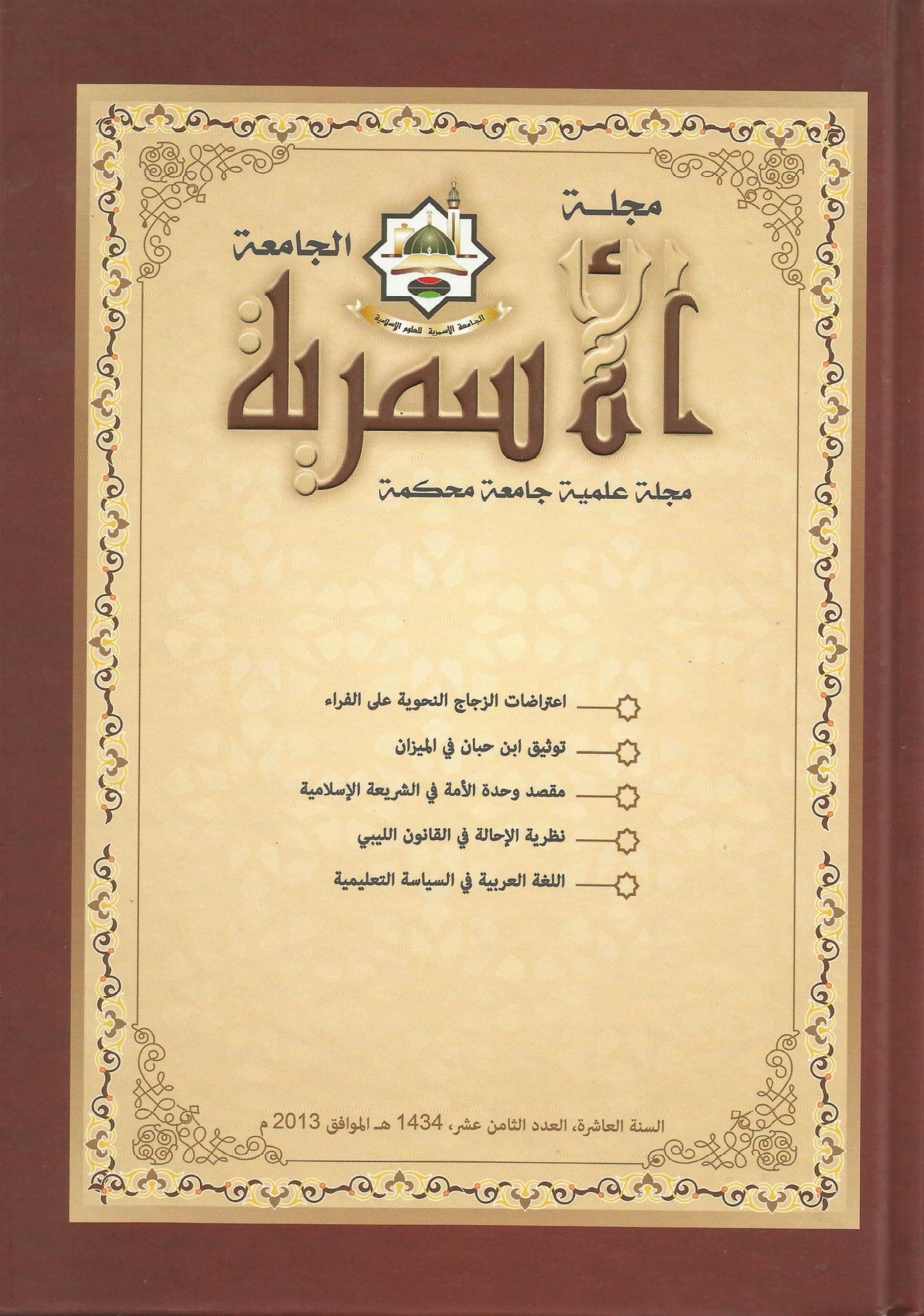A Study of The Optimum Cutting Parameters for The Surface Roughness in A Longitudinal Turning of Aluminum Alloy Using Taguchi Method
عملية الخراطة
Keywords:
Turning ANOVA, Taguchi, Surface RoughnessAbstract
In this paper, the effect of the optimum cutting parameters (spindle speed, feed rate and depth of cut) on the surface roughness of an aluminum alloy (AL-5052) workpiece machined by lathe machine under dry conditions was studied. A carbide cutting tool insert with a constant nose radius was used. Number of statistical methods were used i.e. Taguchi, Analysis of Variation (ANOVA) and the Multiple Linear Regression Analysis. The orthogonal matrix L9, which consists three factors at three different levels for each factor was selected. Results were analyzed using Minitab-16. The "smaller is better" property was applied to calculate the signal-to-noise ratio (S/N Ratio) for each experiment. The analysis of variation was used to determine the most affecting factor on the response variable (surface roughness) by determining the highest contribution in the process. Multiple linear regression analysis was also used in predicting the surface roughness. Results showed that the surface roughness values obtained by the multiple linear regression model are at a close agreement with those from the experiments, where the error ratio was less than 0.8%. Therefore, this model could be used in the prediction of the surface roughness
Downloads
References
M. BenIsa et al., Experimental Investigation of Cutting Parameters Effect on Surface Roughness During Wet and Dry Turning of Low Carbon Journal of Academic Research (Applied Sciences), 2021, Vol. 17.
M. Akhtar et al., Optimization of Process Parameters in CNC Turning of Aluminum 7075 Alloy Using L27 Array-Based Taguchi Method. Materials 2021, 14, 4470. https://doi.org/10.3390/ma14164470. DOI: https://doi.org/10.3390/ma14164470
R. Sivaraman et al., International Journal of Advanced Science and Technology, 2020, Vol. 29, No. 12s, pp. 146-152.
K. Partheeban, et al., Taguchi Optimization of Cutting Parameters for Surface Roughness and Material Removal Rate in Turning Operation, International Research Journal of Engineering and Technology, 2019, Vol. 06 (06).
O. Zurita et al., Effect of cutting parameters on surface roughness in turning of annealed AISI-1020 steel, Journal of the Faculty of Engineering (Rev. Fac. Ing.), 2018, Vol. 27 (47), pp 111-118. DOI: https://doi.org/10.19053/01211129.v27.n47.2018.7928
J. Kumar and A. Sharma, Taguchi based Optimization of Cutting Parameters affecting Surface Roughness in dry CNC Turning of 16MnCr5, International Research Journal of Engineering and Technology. 2017, Vol. 4 (8).
بسترفيلد وآخرون، ، إدارة الجودة الشاملة، ترجمة الحمالي، راشد بم محمد، كلية العلوم الإدارية، جامعة الملك سعود، 2004.
Ott and Lyman, An Introduction to Statistical Methods and Data Analysis, 6th Edition, Brooks cole USA, 2010.
Mohammad and Ibrahim, Optimization of Sustainable Cutting Conditions in Turning Carbon Steel by CNC Turning Machine, J Material Sci Eng, 2017, Vol. 6. Issue 2 • 1000319, 6:2.
S. Debnath et al., Influence of cutting fluid conditions and cutting parameters on surface roughness and tool wear in turning process using Taguchi method, Measurement 78: 111-119, 2016. DOI: https://doi.org/10.1016/j.measurement.2015.09.011
R. Suresh et al. Machinability Investigations on Hardened AISI 4340 Steel Using Coated Carbide Insert, Int. J Ref Metals & Hard Mat 33: 75-86, 2012. DOI: https://doi.org/10.1016/j.ijrmhm.2012.02.019
M. Sarıkaya and A. Güllü, Taguchi design and response surface methodology based analysis of machining parameters in CNC turning under MQL. J Cleaner Prod, 2014, 65: 604-616. DOI: https://doi.org/10.1016/j.jclepro.2013.08.040
M. CemalCakir et al., Mathematical Modeling of Surface Roughness For Evaluating The Effects of Cutting Parameters and Coating Material. J Mat Proc Technology 209, 2009. DOI: https://doi.org/10.1016/j.jmatprotec.2008.01.050
Downloads
Published
Conference Proceedings Volume
Section
License
Copyright (c) 2021 مصطفى عمر حكومه ، معمر مصباح بن عيسى، هيثم عاشور السويحلي، غيث إبراهيم إبراهيم، بشير صالح يونس

This work is licensed under a Creative Commons Attribution 4.0 International License.





